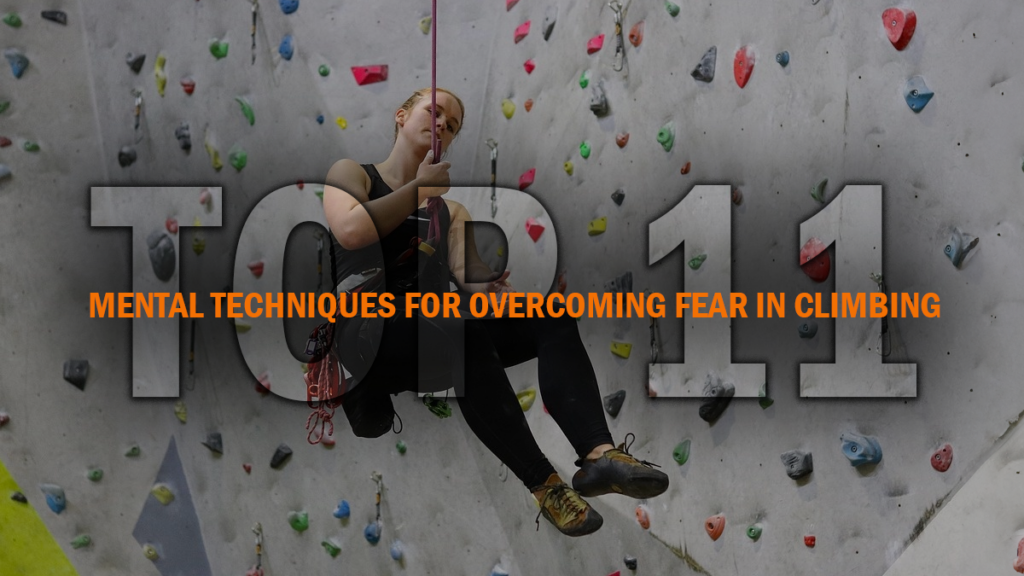Mental strength is a crucial component of climbing that often gets overlooked. Climbing isn’t just about physical prowess; it’s also about mastering your mind. You can have 5.14 fitness, but you will never reach your full potential if you have a 5.4 mindset.
Here are our top 11 effective mental techniques for conquering climbing limits:

1. Visualization: Before even setting foot on the wall, take a moment to visualize yourself successfully completing the climb. Imagine each move, each hold, and the feeling of reaching the top. It’s exciting! Visualization helps build confidence and mentally prepares you for the climb ahead.
2. Positive Self-Talk: Pay attention to your inner dialogue. Negative self-talk will pull you off the wall before you’ve even left the ground. Replace self-doubt and negative thoughts with positive affirmations. Rather than thinking, “I can’t do this, it’s too hard, there’s no way,” tell yourself, “I am capable, and I can overcome this challenge.” Positive self-talk can help boost your confidence and keep fears at bay.
3. Focus on Breath: Controlled breathing is a powerful tool for managing fear and anxiety. Deep, rhythmic breaths can help calm your nerves and keep you focused on the present moment. Try to inhale deep into your abdomen and exhale steadily when taking these deep breaths. Practice steady breathing as you climb. You tend to hold your breath when making a powerful move; remember that you must exhale and repeat when you reach the next hold.
4. Break it Down: Climbing a challenging route can be overwhelming. Break it down into smaller, manageable sections. Focus on one move or sequence at a time rather than worrying about the entire route. This approach makes the climb feel less daunting and allows you to focus on each move as you reach it.
5. Stay Mindful: Climbing requires total concentration. It’s a great way to help quiet the mind and enter a flow state. You’ll want to avoid distractions by staying present in the moment. Don’t worry about what other people on the ground are saying (unless it’s about your own safety). Being mindful of your body, movements, and surroundings can help you make better decisions and stay in control.
6. Accept Fear: It’s natural to feel fear while climbing, especially when pushing your limits! Instead of trying to eliminate fear, acknowledge and accept it as a normal part of the process and keep moving. Use fear as a source of motivation and energy to stay alert and focused on the holds in front of you.
7. Progressive Exposure: Gradually expose yourself to more challenging climbs. Pushing your limits in small increments allows you to build confidence over time. As you conquer one fear, you’ll be better prepared to face the next. Practice Falling: Practice falling? Yes, practice falling. Start small and work your way up. When you learn to trust your gear and your belayer by taking bigger and bigger falls, you can push yourself to try harder and overcome more challenging routes.
8. Learn from Failure: Understand that failure is a part of climbing; there’s no way around it. Sure, on-sighting everything you climb would be super cool, but this doesn’t teach you to be okay when that time of failure inevitably comes. Don’t be discouraged by falls or unsuccessful attempts. Instead, view them as opportunities to learn and grow. Analyze what went wrong, adjust your strategy, and try again.
9. Trust Your Training: Remember the hours of training and practice you’ve put in. Trust your skills and muscle memory. You’ve built a solid foundation to overcome challenging routes, and having confidence in your abilities can help you take calculated risks to push past your fear.
10. Seek Support: A supportive partner or community can make a huge difference in your climbing. Somebody who knocks you down when you can’t make a particular move isn’t helping you make that move. Knowing someone has your back can reduce anxiety and boost your confidence to try harder climbs.
11. Set Realistic Goals: Establish clear, achievable goals for each climbing session. If you’re a solid 5.11 climber, you likely shouldn’t start projecting 5.15. Try breaking into the 12s! Remember to celebrate your small victories and use them as stepping stones to reach your larger climbing aspirations.
By incorporating these mental techniques into your climbing routine, you’ll be better equipped to conquer your limits, push past fear, and reach new heights in your climbing journey. Remember that mental strength is as essential as physical strength in climbing, and mastering it can lead to remarkable progress on the wall.

